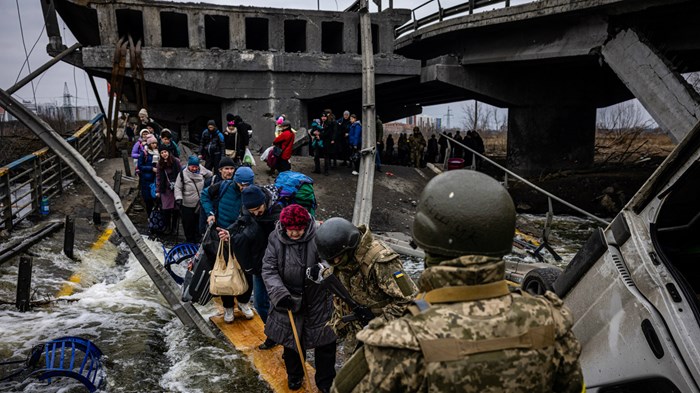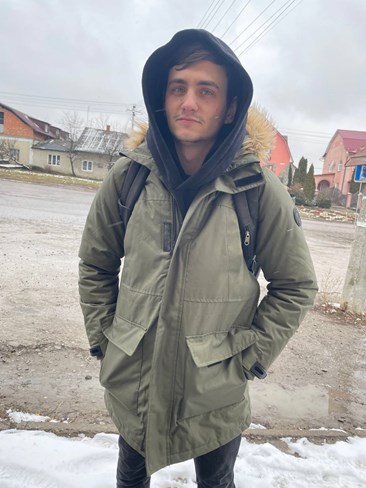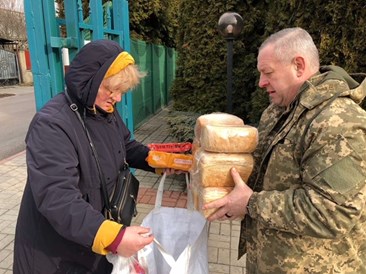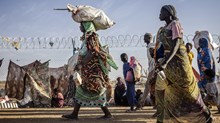
Anatoly, a 26-year-old member of Irpin Bible Church (IBC), is with the Lord.
His last act on earth was to carry the suitcase of a young mother and her two children, hurrying them across Irpin’s collapsed bridge to safety from Russian shelling.
All four died, when a bombshell landed in the middle of their would-be humanitarian corridor. Eight total died in the suburb of Kyiv yesterday, as Russian troops pressed hard to encircle the Ukrainian capital.
“Anatoly was deeply spiritual, with a good Christian character,” said his pastor, Mykola Romanuk. “When he saw a need, he tried to help.”
Negotiations over the weekend led to several ceasefires for civilian evacuation, only to be quickly broken. Each side blamed the other, and Russia has denied targeting civilians.
But Ukrainian sources describe cities now littered with bombed schools, hospitals, and residential districts—not least in Irpin, known in evangelical circles as the “Wheaton of Ukraine.”
After the fall of the Soviet Union, Ukraine’s “evangelical patriarch” Gregory Kommendant invited Christian ministries to join him in his hometown, 16 miles northwest of the capital, where he served as president of the All-Ukraine Baptist Union.
As of a few days ago, about 25 ministries operated out of Irpin, including Child Evangelism Fellowship, Youth With a Mission, Youth for Christ, the International Fellowship for Evangelical Students, and Samaritan’s Purse.
Once home to a single evangelical church, Irpin now boasts 13.
“We were here for 20 years, and neighbors never set foot in our church,” said Romanuk. “Now they are living in our basement, praying with us, and have become our friends.”

Anatoly, a 26-year-old Ukrainian Christian, was among the civilians who died in Russian attacks on Sunday.
Describing Irpin as “secular,” Romanuk described his 700-member Baptist congregation as the largest church in the city of 60,000 people. But now, only a team of five remain, called to stay behind and minister to those under siege.
Led by the head of the missions committee, a deacon’s wife—a real estate agent—is the chief cook. She prepares three meals a day for 200 people, as others volunteer to evacuate the shellshocked citizens to western Ukraine.
Since the war began, the church has transported 100-200 evacuees every day, Romanuk said. As the Russians approached, they bused out 3,000. Early on, the government took notice of their efforts and thereafter directed everyone to the church.
Anatoly was one who returned.
Originally from Luhansk in the Donbas region, he began attending Irpin Bible Church in 2020, becoming a member last year. An IT professional in a local company, he served in media ministry with Romanuk’s son.
After evacuating his wife Diana and other family members to safety in the west, he joined the church’s skeleton crew on Friday. The shelling began in earnest on Saturday, and they hustled out as many people as they could, crossing the bridge the Ukrainian army had damaged to slow the Russian advance.
On Sunday he went missing. Friends worried, prayed, and scanned social media for photos of the dead. They saw his sneakers in one, his sweater in a second. A few minutes later, the third photo revealed his face.
“We miss him very much, it is a tragedy for his family and the church,” said Romanuk. “God has a plan beyond our understanding, but it is difficult.”
Igor Bandura, a fellow pastor at IBC, is now counseling Anatoly’s brother, in Lviv. Deep in grief, he is trying to find someone to take the reverse journey, 335 miles back east to Kyiv, for the funeral.
“We had to leave everything behind. Some of us did not even have time to take the necessary clothes with us,” said Bandura, vice president of Ukraine’s Baptist Union. “We don’t know what fate has befallen our homes. We don’t know if there will be a place to come back to.”
At least there is a way back in. The nearby suburb of Bucha—home to the president of Ukrainian Evangelical Theological Seminary (UETS) in Kyiv—is completely under Russian control.
But Ivan Rusyn refuses to evacuate.
“This war has completely redefined my understanding of mission and holistic ministry,” he said. “You cannot show compassion from a distance.”
Rusyn and his seven remaining colleagues coordinate relief from the offices of the Ukrainian Bible Society, where he sleeps at night on the floor.
The seminary is now only 1,000 feet from the front lines.
Evacuated on Friday, today UETS sent the final nine of 300 faculty, staff, students, and family members to safety in the western part of Ukraine. But each day his team sends a bus to Irpin with daily food, water, and medicine.
“It is a catastrophe,” he said. “There is fear in the eyes of the children.”
Tearing up from the experience, Rusyn said he carried the disabled on his shoulders to reach the evacuating buses. But then he spoke of his joy, seeing the smiles on Ukrainian soldiers who know that the prayers of pastors and priests remain.
“Our commitment is that no one here will be left hungry,” he said, promising to stay in the capital as long as President Volodymyr Zelensky. “Christian leaders that remain in Kyiv and other cities are the incarnated witness of Jesus Christ.”
But it is felt elsewhere, too. Care for the 1.7 million refugees is being given across Eastern Europe. Many have given up their beds, said Sergey Rakhuba, president of Mission Eurasia, and are now sleeping on mattresses.
“I’m devastated, tired, and overwhelmed,” he said, currently supervising work in Poland. “My heart has broken into a million pieces.”
But his organization was also based in Irpin, and the 12 staff members who remain in Ukraine have reorganized in two western cities.
There is a catastrophic shortage of medicine, he said. But an even greater need for pastoral care.
“I asked for their prayer requests,” Rakhuba said, recalling with tears. “The refugees mention their husbands, their fathers, and their sons—and when they hug you, they don’t let go.”
Born in Donbas, he married his Russian wife in 1983 and lived in Russia for the next 15 years. He often heard them call Ukrainians “brothers.” Mission Eurasia relocated to Ukraine from Moscow in 2007, due to government pressure against foreign influence. But today’s complete change in spirit is jarring, and makes him think of the demonic.
“Irpin became a spiritual capital,” Rakhuba said. “Alongside the military aggression, now it is a place of spiritual warfare.”
Mark Elliott, editor emeritus of East-West Church Report, once was on the faculty at Wheaton College—and watched the American evangelical relocation to Colorado Springs. The comparison to Irpin was obvious, especially once ministries started coming from Moscow.
“It was both a push and a pull,” he said. “Increasing Russian restrictions facing non-Orthodox believers and institutions, over against the robust religious tolerance of Ukraine.”
For 70 years the nation was under the bondage of Soviet communism, Rusyn said. But the church used well the 30 years of freedom that followed. If it is not protected now—he calls for a no-fly zone to be imposed—its loss will sour the taste of freedom for Western friends who are doing their best to help, but whose governments stop short of full involvement.
“We preached the gospel, we sent missionaries, we haven’t harmed anyone,” he said. “Our message to the Russians is just leave us alone.”
Zelensky has called for a more robust sanctions plan—even a full embargo.
The weekend’s damage has been far wider than Irpin.
In Mariupol, where an estimated 200,000 people are trying to flee, one of the few buildings remaining intact is Central Baptist Church. Built in the early 1990s, the founding pastor’s daughter said people originally complained that the basement was too big.
Yesterday, as shelling closed a negotiated corridor, over 75 people gathered below for Sunday worship.
Less fortunate, reported pastor Vyacheslav Voronin to Taras Dyatlik, Overseas Council regional director for Eastern Europe and Central Asia, was the Baptist congregation in Izyum, established in 1998. Located near the fighting in the region of Kharkiv, the church served the displaced until it was hit last night by a Russian shell and caught on fire. Most families are now evacuating to western Ukraine.
And in the seaside port of Odessa, Alexander Boichenko returned after evacuating his family to continue serving in his church’s disaster relief center. Three weeks ago, they were planning the June wedding of their daughter.
“My wife leaned in and whispered quietly, ‘Might this be forever?’” he said. “I smiled at her comfortably, but my soul burst into tears.”
His work is not in vain. Ukrainian sources are all clinging to God.
“The most important task for the church right now is to continue preaching,” said Rakhuba. “Churches have become a lighthouse of hope.”
This is despite the “brutal and inhumane” aggression of the Russian army, whose tanks are pressing toward Kyiv, said Bandura.
“But we pray and work—with hope and faith—that God will prevail,” he said, “and reveal his glory in Ukraine.”
The significant damage does not deter them.
“We might lose our campus, but after a conflict there is a chance to build anew,” said Rusyn. “Evangelical churches will become stronger and an integral part of our society.”

Staff from the Irpin Bible Seminary distribute bread to refugees and those at a local hospital.
The scattered believers will do what they can.
Irpin Bible Church had 67 small groups before the war, said Romanuk. His pastoral team will contact each member, and offer whatever help possible.
But then he will encourage them: Each one should form a new small group, wherever they are, and join the local evangelical church.
Today, however, he evacuated also. Headed west to his family in Lviv, his Google calendar notification reminded him a 400-person pastoral conference was about to begin back in Irpin.
“God has given us a new ministry,” Romanuk said. “Our conference is now with the homeless, the handicapped, and the nonbelievers of our town.”

Support Our Work
Subscribe to CT for less than $4.25/month




















